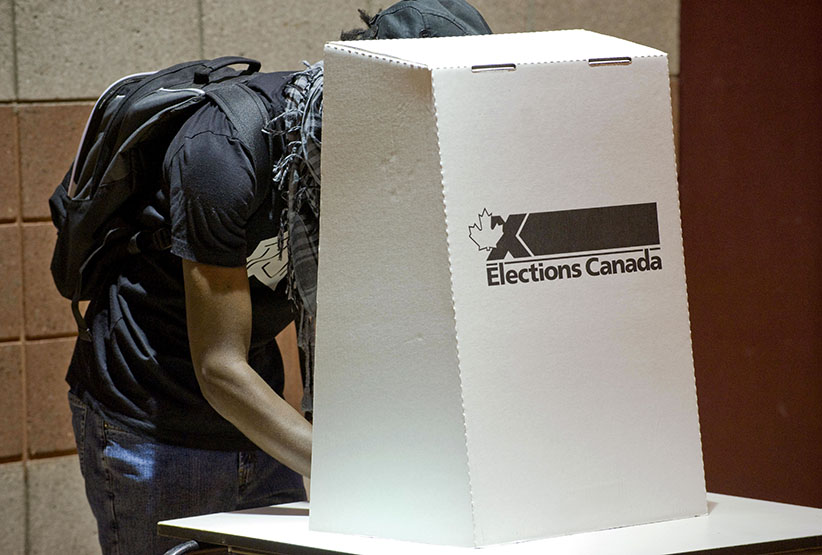When it comes to voting, we listen to our friends, not our folks
Sorry, Mom and Dad — the political influence of parents this federal election might be less than you expected.
A Canadian prepares his ballot at a polling center October 14, 2008 in St. Laurent, Quebec. Canada is the first major economy to go to the polls since the start of a global financial meltdown, to be followed by a US presidential election November 4. Rogerio Barbosa/AFP/Getty Images
Share

If your kids were apples and you were a tree, chances are they would fall afar. Similarly, if vote choice was once determined by dinnertime rants and the news anchors on family televisions, the means of transmission have changed, and you can no longer expect your son or daughter to become your political mini-me.
“Parents are now just one factor among many,” says Michael McDevitt, a professor of communications at the University of Colorado. “Social media is a stronger engine of influence.” McDevitt and others have found a squiggle in the linear transmission of voting behaviour from parent to child. “Recent research shows parents don’t have near as much influence as once assumed,” he says. “People are shopping around for their partisan identities.”
Betsy Sinclair, author of The Social Citizen: Peer Influence and Voting Behavior, published in 2012, found that voters tend to have four or five people with whom they discuss politics, and about 60 per cent of these discussants are not family members but rather friends, co-workers and neighbours. Only one in five people have any political discussant with whom they live. In her study of nearly 1,500 voters, participants could correctly guess the voting behaviour of 80 per cent of the people with whom they discuss politics—partly, she says, because they had persuaded them to vote that way themselves. “Political behaviours are likely to be socially contagious,” Sinclair concludes. “Even strong partisans are not immune.”
Here, the chicken-and-egg argument comes pecking. Do we simply choose pals who share the political ideas we already hold? McDevitt and Sinclair control for “homophily”—the concept by which we surround ourselves with similar people. It turns out we don’t choose our political confidants by their political views, but rather in the same way that we choose any of our friends: by race, gender, age, geography, education level, religion and personal interests. Even though our peers will never be told how we vote, Sinclair says, “there does not necessarily need to be fear of punishment for non-conformity for social pressure to occur. People want to avoid disagreement.”
All of these findings stand opposite to widely renowned research from the 1960 study “The American Voter,” which showed voters maintained “persistent adherence” to their parents’ favoured parties. Voters imitated their parents’ decisions so closely that some academics speculated voting behaviour was genetic.
Lisa McAvoy, a voter in Toronto whose father voted Conservative, will be voting Green this election. “I don’t agree with many of my parents’ opinions,” she says. “I spend a chunk of free time on social media. I absolutely pay attention to the comments, and they do influence me.” She also says she doesn’t know how her two sons, aged 6 and 8, will vote when they’re 18. “There may be technology that doesn’t even exist yet that will influence them. Maybe they’ll vote for one of the traditional parties, which I’m totally good with.”
Tom Pearson, an NDP voter in Newmarket, Ont., had a mother who was awarded for her volunteerism with the Conservative government during Brian Mulroney’s tenure. Now, Pearson blogs in support of NDP politicians. Barbara Saunders votes differently than her parents as well. “We were a very Christian family,” she says. “We were supposed to vote traditionally, blah blah blah. Then I went to university and learned otherwise.” And Judith Perry of West Nova, Nova Scotia, votes Liberal, NDP or Green, while one of her sons votes Conservative. “Some people will unthinkingly do the reverse of their parents,” she says, “because that’s a rebellion.”
In fact, the more parents discuss politics with their children, the more likely the children are to deviate in political opinions. An article in the British Journal of Political Science, titled “Why does the apple fall far from the tree?” explains that children exposed to politics at home are more likely to seek out political discussions in the future and thereby form new opinions.
The trend toward friend-influenced voting is intuitive, say several academics studying the topic. “Given Facebook and all our other social media interactions, peers should be an especially strong influence,” says Alison Ledgerwood, an associate professor of psychology at the University of California who looks at voting behaviour within social groups. She also says we’re swayed by what’s on our minds at the moment we cast our ballots. A last-minute tweet or conversation with a co-worker can cause a “momentary shift” that decides our votes, regardless of what we’ve been exposed to since childhood.
“A generation ago, we had long conversations with our parents,” notes Jon Rogowski, a political scientist at Washington University. “Today, we’re influenced by the accumulation of connections with our peers.”
And this may be a cycle. The less that family members agree in politics, the more likely they are to avoid the topic. Cory Judson of Burlington, Ont., says his father voted Conservative, while he votes NDP, and his in-laws vote differently still. “Guess you could say we don’t talk politics at Thanksgiving.”
[widgets_on_pages id=”Election”]